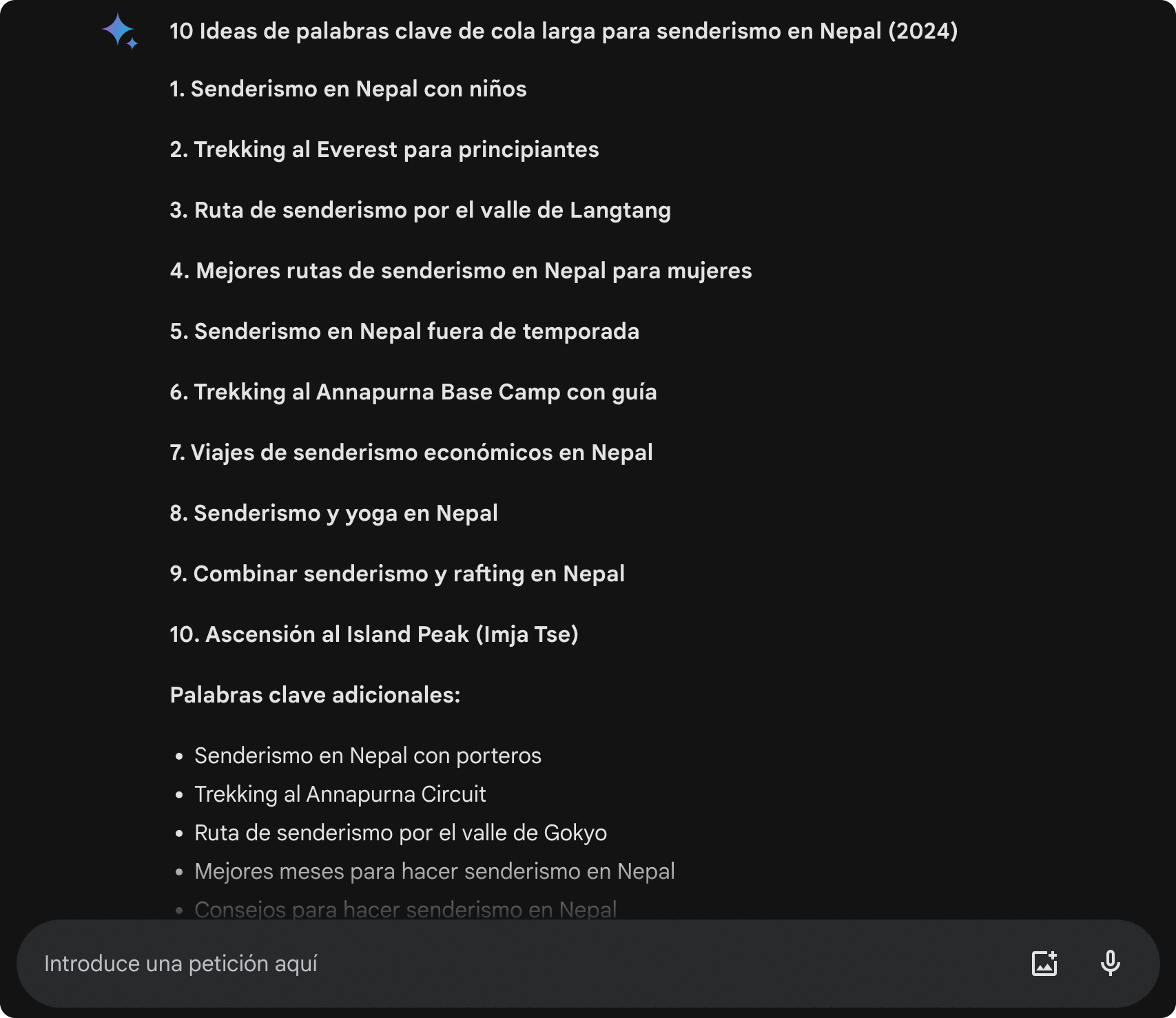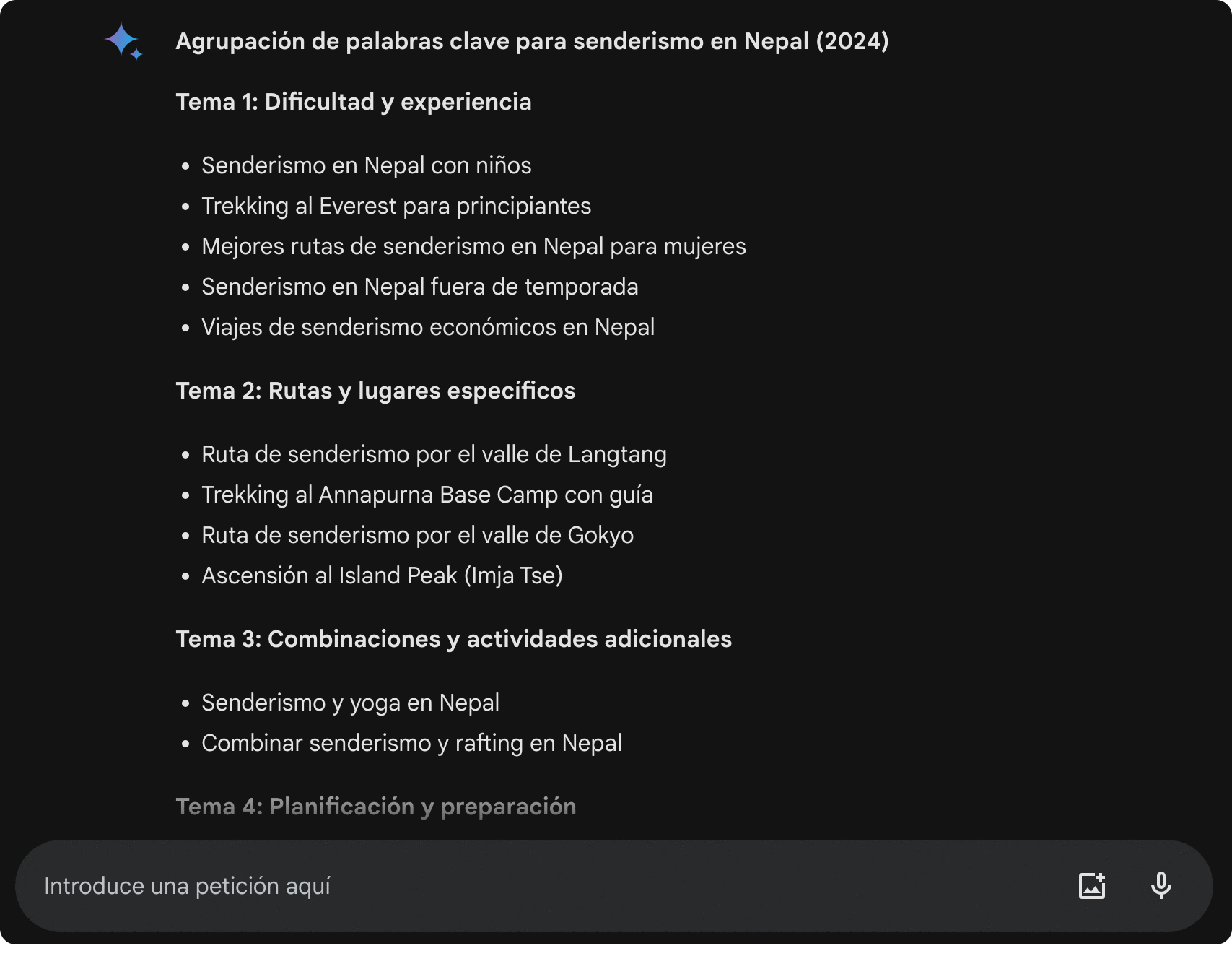SEO, it's time to leave your old keyword optimisation tactics behind. Google Gemini has arrived, and it's transforming the rules of the game, to the question of how Google's Gemini will affect keyword researchWe will try to see it in this article.
This AI model promises to revolutionise search, but there is no reason to panic: SEO remains vital.
It is crucial to adapt so as not to fall behind. This guide will provide you with the knowledge you need to excel in the new era of Gemini-driven search. You will learn about the challenges, effective strategies and how to outperform the competition.
Ready to secure your SEO future? Let's dive in.
Understanding Google Gemini
What is Gemini and why is it so relevant?
Imagine a cutting-edge AI brain, constantly learning and evolving. Unlike search engines that focus on keywords, this AI analyses information in all its forms: images, videos, music and even code. This is the power of Gemini, an AI model that could soon be integrated into Google search and beyond. It grasps complex ideas and answers the most complicated questions.
In fact, Gemini is Google's most advanced AI model, surpassing even the famous ChatGPT-4. Impressive, isn't it?
Although Gemini will be used in several Google products, what worries SEOs most is its application in the Generative Search Experience (GSE). SEOs fear that the EGS may capture the majority of their organic clicks, even if the site ranks first.
In addition, Gemini is already behind Google Bard. Recently, its name was changed to Gemini to avoid confusion. You can experience the capabilities of the Gemini AI first hand, for example, by asking the Gemini chatbot to find flights.
How Google Gemini will transform search and SEO
Get ready for a radical shift in search. With the arrival of Google Gemini, SEO is likely to evolve from focusing on keywords to focusing on user intent and entities. Let's see what's in store:
Entities will be protagonists
Search results will focus on connections and relationships between entities, not just isolated keywords. Imagine your website as an interconnected knowledge node.
Impact on search and SEOYou will need to optimise both your content and the structure of your site to reflect these connections. Building thematic authority around the selected entities through comprehensive content covering related entities and sub-themes will be key.
Implications for keyword researchThe research should evolve from focusing on individual keywords to understanding the relationships between relevant entities. For example, the connection between "hiking shoes" and entities such as "mountain trails" or "backpacking equipment".
From Keywords to User Intent
Gemini will prioritise understanding the "why" behind users' searches, seeking to provide answers that comprehensively satisfy their queries.
Impact on search and SEOThe relevance of search results will increase. The key will be to create content that directly answers users' questions, reflecting their search intent.
Implications for keyword researchIdentifying long tail keywords and understanding the context of searches will be essential. Prioritise keywords that reveal user intent, such as "best hiking shoes" or "how to choose hiking shoes for beginners".
Personalised Search
Personalisation of search results will be deeper, based on each user's history and preferences.
Impact on search and SEOBusinesses should focus on creating content that responds to the specific needs of their audience, ensuring that it remains current and relevant.
Implications for keyword researchResearch should lean towards long tail keywords that reflect specific user needs and locations, focusing on the "why" behind the searches.
How to adapt your keyword strategy to Google Gemini
Based on the information provided by Google, I see it this way: combining entity-based SEO and keyword research is the solution. By doing so, you will be able to leverage the strengths of both methods. Here are some key steps to get you started:
1. Start by understanding your entities
First of all, you need to identify the main entities relevant to your niche. These could be your brand, products, services, geographic locations, etc.
Once you have done this, you will need to research and define each entity. Gather information about each, including its properties, related entities and users' search intent. This can be done through Google Search, Wikipedia, related websites and specialised databases.
For example, imagine you are an SEO for an adventure travel agency specialising in unique hiking and trekking experiences. You need to identify key entities that go beyond just "hiking" or "trekking".
You deepen your research, identifying specific locations such as Nepal and Patagonia. You also identify popular routes such as the Annapurna Circuit and Torres del Paine. In addition, you explore related entities such as difficulty levels, including moderate and challenging trails.
You consider seasonal aspects, such as the monsoon in Nepal. Finally, you look at specific activities such as cultural immersion and wildlife encounters.
By researching these entities through Google, travel blogs and official tourism websites, you can gain a comprehensive understanding of user intent and search behaviour. In addition, you can explore relevant subtopics to enrich your content strategy.
2. Conduct keyword research with an entity-based turnaround.
Instead of focusing only on individual keywords, incorporate keywords related to your identified entities. This could include variations of entity names, related concepts and associated questions.
To do this, use word research tools such as: ahrefs, semrush, MOZ, Gogole Ads, etc...
The article may help you What are keywords? of our blog.
You can also use keyword tools with entity understanding. For example:
- Google Cloud Natural Language API will help you identify entities, analyse sentiment and classify text. Use Google's knowledge graph for accurate identification of entities and relationships between them.
- Amazon Comprehend is a service that provides various natural language processing (NLP) functionalities, including entity recognition. It can identify different types of entities and link them to relevant Wikipedia articles for reference.
- Microsoft Azure Text Analytics is a cloud service that offers entity recognition and language understanding features. It uses Microsoft's knowledge graph for entity recognition and provides insights such as sentiment analysis and key phrases.
- Google Knowledge Graph Search Engine is the tool that allows you to search the entire Google "Knowledge Graph" database for a person, company, product, place or other entity.
- Ahrefs Keywords ExplorerSEO tool for keyword research and analysis. Allows users to discover keyword ideas, evaluate their traffic potential and analyse ranking difficulty. Essential for optimising content strategies and improving search engine visibility.
With these tools, you can explore and expand your list of entities and incorporate entity data more quickly.
3. Ask Gemini for help with your keyword research.
Why not? Let's ask the Gemini chatbot to enrich your keyword list. The request will be similar to that of ChatGPT.
For example, your application could be as follows:
I am writing blog posts about trekking in Nepal for 2024, aimed at readers who want to learn as much as they can about it. My goal is to optimise my content for search engines using relevant long tail keywords related to the general term 'trekking in Nepal'. ¿: 10 Long-tail keyword ideas for trekking in Nepal (2024)
long tail keyword ideas generated by Gemini
I asked Gemini how he arrived at these ideas and he replied:
I generated 30 long tail keyword ideas for your blog posts about trekking in Nepal considering user intent, search relevance and current trends. I used brainstorming, mock keyword research and user persona development to create a diverse list that targets specific information needs while optimising for search engines.
So, let's say you can trust that these ideas are really useful.
4. Integrate knowledge into your content strategy
Once you collect all your entity-related keywords, start consciously incorporating them into your content plan.
Create entity-focused content clusters
Organise your content around entity-focused clusters. This involves creating a central piece of content that serves as a hub for an entity and then developing supporting content around related sub-topics.
Again, you can ask Gemini for help with content grouping: Now, group the keywords with similar interns into the appropriate broad themes.
Develop content around entities
Develop content that comprehensively covers your chosen entities, providing value and insights. This could be blog posts, guides, product descriptions, FAQs, etc.
To learn how to create perfectly optimised content, read this post on How to write prompt for ChatGPTThe way to deal with a text will be similar from Gogole Geminis and Chat Gpt, except for specific guidelines for each AI.
Tip: Optimise your content for the right keywords in Content Editor. Using it, you can maximise the potential of your existing pages or create new content based on live SEO recommendations as you write.
Connect entities within your content
Use internal linking to connect related entities on your website. This helps search engines understand the relationships between your content and entities.
Use Schema markup
Implement structured data markup (Schema.org) to explicitly define entities and their relationships within your content. This provides even clearer signals to search engines.
Following our example, you don't just create isolated blog posts. You build content clusters centred on entities. For example, you build a comprehensive guide on "Trekking in Nepal" as the centrepiece, serving as a hub for all information related to trekking in Nepal.
You can then focus on individual blog posts focused on specific trails (e.g., Annapurna Base Camp), their difficulty levels (e.g., Best Easy Routes in Nepal) and packing lists (e.g., the one tailored to the monsoon season). We connect these pieces through internal links and schema markup, ensuring that search engines understand the relationships between entities and our expertise.
The challenges Gemini could bring
Whenever we encounter something new, it can be difficult to get used to. When Google Gemini becomes part of our search experience, it may bring some challenges we'll need to overcome. Here they are:
Increased competition
Google Gemini is very good at understanding user intent and context. This can lead to a more refined and personalised search experience for all of us. While this is beneficial for users, it also means you could face increased competition for visibility in search results.
Therefore, you will need to work harder to stand out and capture those top positions in the SERP.
Also, keep in mind that the Gemini-driven SGE will take up most of the screen space and organic results will be harder to find. This makes competition even tougher because there is less space for websites to appear. And only the best will be able to get into the SGE snippet itself.
Continuous learning and adaptation
It may seem obvious, but I need to point it out anyway: Google Gemini's evolving and ever-changing search requires continuous learning and adaptation.
The point is that the Google algorithms are constantly evolving (we are used to it), and Gemini is likely to introduce new ranking factors and changes as well. You need to keep an eye on algorithm updates, analyse their impact on search results and adjust your strategies accordingly.
In addition, the dynamic nature of user behaviour adds another layer of complexity. User behaviour and preferences are constantly changing, influenced by technologies, social trends and economics. You will need to monitor these changes in user behaviour. So, keep an eye on changes in search queries or browsing habits and adjust your strategies in time.
Conclusion
So, SEOs, get ready. Google Gemini may change the game forever. It will fundamentally change keyword research from a purely volumetric, competition-based approach to one focused on understanding user intent and context.


